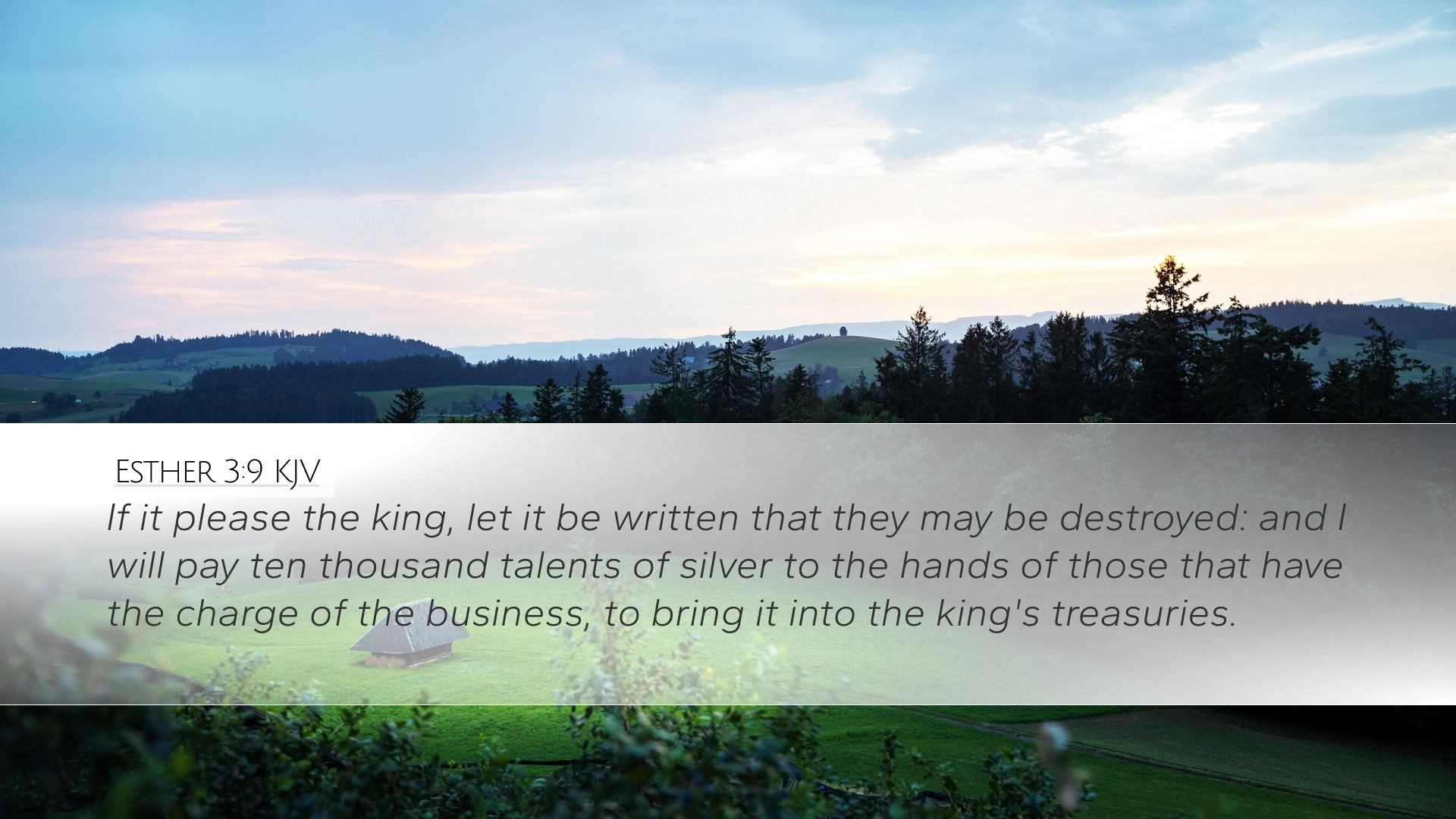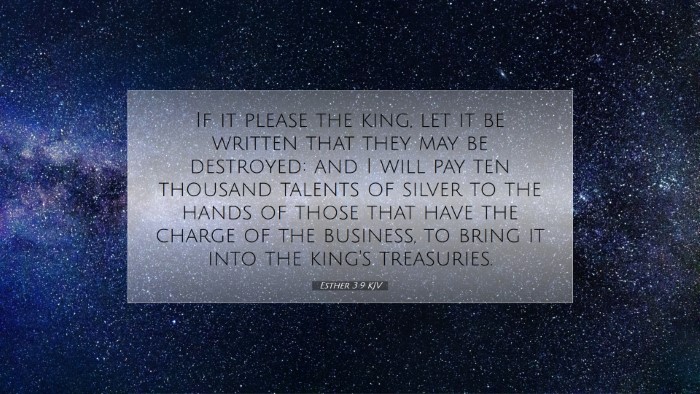Old Testament
Genesis Exodus Leviticus Numbers Deuteronomy Joshua Judges Ruth 1 Samuel 2 Samuel 1 Kings 2 Kings 1 Chronicles 2 Chronicles Ezra Nehemiah Esther Job Psalms Proverbs Ecclesiastes Song of Solomon Isaiah Jeremiah Lamentations Ezekiel Daniel Hosea Joel Amos Obadiah Jonah Micah Nahum Habakkuk Zephaniah Haggai Zechariah MalachiEsther 3:9
Esther 3:9 KJV
If it please the king, let it be written that they may be destroyed: and I will pay ten thousand talents of silver to the hands of those that have the charge of the business, to bring it into the king's treasuries.
Esther 3:9 Bible Commentary
Commentary on Esther 3:9
Verse: "If it pleases the king, let it be decreed that they be destroyed; and I will pay ten thousand talents of silver into the hands of those who have charge of the king's business, that they may put it into the king's treasury." (Esther 3:9, ESV)
Introduction
The verse under consideration, Esther 3:9, reveals a pivotal moment in the narrative of the Jewish people during their exile. It introduces Haman's insidious plot against the Jews and sets the stage for the unfolding drama of deliverance and divine providence. The insights drawn from public domain commentaries by Matthew Henry, Albert Barnes, and Adam Clarke provide rich theological and historical perspectives on this passage.
Contextual Background
This verse occurs in the context of Haman's rise to power within the Persian Empire after the appointment of King Ahasuerus. Haman, an Agagite, becomes enraged at Mordecai's refusal to bow to him, prompting his bitter desire for revenge against not just Mordecai but the entire Jewish populace.
- Historical Context: The decree to annihilate the Jews signifies the extreme measures taken against minority groups throughout history, invoking reflections on themes of persecution and survival.
- Cultural Context: Understanding the cultural and historical backdrop of the Persian Empire helps comprehend the vulnerability of the Jewish people at this time.
Analysis of Haman’s Proposal
In this verse, Haman offers a significant bribe—ten thousand talents of silver—which is a colossal amount, intended to influence the king's decision-making.
- The Offer: This act of bribery indicates Haman's unscrupulous character. He is willing to use wealth to fuel his vengeful agenda, suggesting a broader theme of corruption within political systems.
- The King’s Authority: Haman seeks the king’s authority to eradicate the Jews, highlighting the danger of absolute power when placed in the hands of someone driven by hatred.
Theological Implications
The implications of Esther 3:9 extend beyond its historical context and invite deeper theological reflection:
- Divine Sovereignty: Despite Haman’s plots, God's sovereignty remains a central theme in the Book of Esther. Haman’s actions exemplify human malice, yet God's providence will ultimately lead to the preservation of His people.
- Faith and Courage: The narrative challenges believers to exhibit faith and courage in the face of overwhelming odds. Esther's later courage in approaching King Ahasuerus demonstrates a key response to such challenges.
Exegetical Insights
In interpreting Esther 3:9, the commentaries provide valuable exegetical insights that underline various themes:
- Adultery of Power: Henry discusses the 'adultery' of seeking strength through wealth and manipulation, which leads to unjust decrees and terrible outcomes. Haman embodies this vice.
- Class Distinction: Barnes highlights how Haman's proposal reflects a broader societal issue where wealth and status could determine life or death, emphasizing the need for moral integrity.
- God’s Hidden Government: Clarke points out that even when God's hand seems hidden, He is actively orchestrating events for the good of His people. Haman's overstepping of boundaries ultimately leads to his downfall.
Practical Applications
Esther 3:9 can serve as a profound source of reflection and application for contemporary readers:
- Awareness of Oppression: The modern reader is called to recognize and stand against injustice and oppression in society, echoing the call for advocacy seen in this text.
- Integrity in Leadership: Leaders are urged to act with integrity, resisting corruption, and prioritizing justice over personal gain or influence.
- Dependence on Divine Providence: This passage encourages believers to trust in God’s sovereignty even when circumstances seem dire, akin to the Jewish people’s eventual deliverance.
Conclusion
Esther 3:9 exemplifies the hidden complexities of human motives, the dangers of unchecked power, and the ultimate assurance of God’s providence. As Haman schemes against the Jews, we see the unfolding of a greater narrative where God’s faithfulness prevails. This commentary invites theological reflection and encourages a deeper commitment to justice, integrity, and faith in God’s sovereign plan.


